By Lucy Komisar
The Americans had to be kept in the dark, out of the loop, not told anything about the secret Oslo talks between Israelis and Palestinians. Because the Americans’ big-power arrogance would derail them.
That is a provocative note in “Oslo,” J.T. Rogers‘ play about the back channel negotiations that led to a ground-breaking Israeli-PLO agreement signed at the Clinton White House in 1993. It would create the Palestinian Authority, with limited government over the West Bank and Gaza and agreement for both sides to continue negotiations.
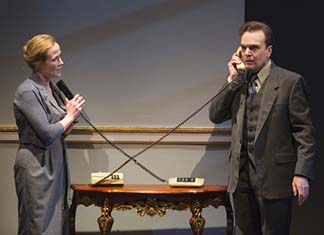
The meetings were organized by a Norwegian diplomat and her husband. In 1992, the couple had visited Cairo and were strongly affected by what they saw. In a backdrop video, we see two young boys, either side of the Intifada, confronting each other.
A year later, the couple arrange the meetings. The play is based on Rogers’ extensive interviews with them.
Jennifer Ehle is cool and strong as Mona Juul, who works for the deputy foreign minister. Jefferson Mays is terrific as her husband, Terje R¸d-Larsen, the passionate, energetic, crisply-accented think tank director. Director Bartlett Sher makes you think you are watching a documentary, though Rogers acknowledges that of course some of the dialogue or scenes are made up.
See this play as a lesson in how diplomacy can work. When both sides want it to work. And they keep meddling third parties, with their own agendas, out. The meetings started in January 1993 and went on for nine months.
Larsen‘s theory is to root the meetings in the personal, to build trust one issue at a time. And certainly not to lay out a road map that envisions solving everything in a defined time frame.
Juul organizes the meeting without telling her incoming foreign minister, Johan Jorgen Holst (T. Ryder Smith).
Later both the Norwegian foreign minister and his deputy will agree to keep the Americans uninformed.
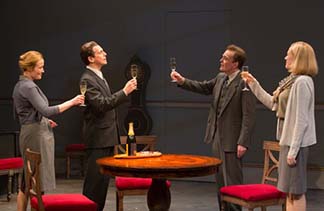
Holst is especially contemptuous of U.S. Secretary of State Warren Christopher. He calls him a wet fish, and says, “No wonder the Americans can‘t make peace in the Middle East.”
Larsen explains to Holst, “The Americans can strong-arm both parties to the table, but just because you drag a horse into a bar does not mean it can mix its own cocktail.” The Norwegians have neutrality. They are not seen as backers of Israel. It helps that these Norwegians are all connected: Juul works in the foreign ministry, the minister’s wife works for Larsen.
Juul persuades Yossi Beilin (Adam Dannheisser), a top aide to Israeli foreign minister Shimon Peres, and Ahmed Qurje (the very fine Anthony Azizi), the PLO finance minister, to support secret conversations in Norway. Israel, which made direct contact with Palestinians a criminal offense, is represented by two academics. They communicate with Beilin, who thinks the Israeli policy is a disaster, pointing out, “In Europe they are calling us Nazis.” We see backwall videos of demonstrations and violence.
And Larsen tells Beilin: You are trapped in a process that is rigid, impersonal, and incapable of building trust.
Beilin says, Yes. Yes. I agree”completely! But this is what the Americans want us to do.
Larsen: And so you must do it. But, also, establish a second channel, built on the exact opposite model. Not grand pronouncements between governments, but intimate discussions between people. Held somewhere isolated”totally”where you and the PLO can meet, alone, and talk. This model, I can oversee; this place, I can arrange.
Still, Mona tells her husband, The Americans view the Middle East as theirs. Do you know what their government will do to ours if we are caught meddling without permission?
He replies, Mona! How are things going to stay hidden if the Americans are involved? It will be over before it begins. Look at their record with keeping secrets. Disastrous!
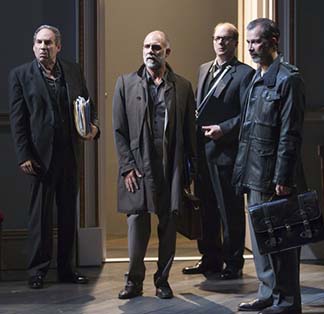
The secret meetings are held at Beaurigard Castle south of Oslo. Terje and Mona (all is soon on a first-name basis) are facilitators, not directors of the meetings. They provide food and drink and usher the participants into a private room.
The first meeting is between Qurje and Yair Hirschfeld (Daniel Oreskes), a nervous professor of economics who begins with a long joke. Qurje had been blocked from taking part in American-run negotiations in London. He erupts in fury at the recollection.
They speak for two hours about economic development and promise to share their papers. In future meetings, Qurje would be known as Abu Ala, his PLO name.
The play shows the minor mishaps that almost happen. The cook announces to the Norwegians that dinner will be roast pork”which of course is not served! So the Israelis and Palestinians agree about something.
Then each side brings in a colleague. Hassan Asfour (Dariush Kashani), a caricature of a radical Marxist, attacks the bourgeois construct of family.
Ron Pundak (Daniel Jenkins), an Israeli academic, tells a joke. “Interpol, the CIA, and Mossad are chasing a rabbit. They come to the edge of a forest. Interpol combs the forest; they cannot find the rabbit. The CIA burns down the forest, but still no rabbit. Then Mossad says, “Give us thirty minutes.” They go off. Half-hour later, they come back with a grizzly bear in a headlock, with a broken nose and black eye, and the bear is yelling: “Okay, I‘m a rabbit! I‘m a rabbit!”
In the discussions, the Palestinians propose to take over Gaza, something Israel has wanted for years.
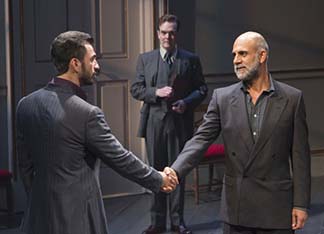
They hammer out a draft declaration of principles recognizing the grievances of both sides. When they communicate by phone, they use code names. Israel is “The Little Country.” The Palestinians are “Those Across the Sea” and Abu Ala is called Puntoffle, which means slipper in Yiddish. (That is never explained.)
We see the Israelis and Palestinians in the outer room seated on red cushioned chairs at a small round wood table. They drink a lot of scotch. Tension heats up over Gaza. There is the threat of a setback when killings in Gaza seal that territory. And the Norwegians don‘t always tell the truth. Abu Ala wants the Israeli economist upgraded to a foreign ministry official, and they say it will happen, but it doesn‘t happen right away.
I saw the play with a friend who is well connected to Israeli politics. She found the show fascinating but pointed out that the Israelis are not real doubles: she said Yossi doesn‘t talk crudely that way.
And Uri Savir (Michael Aronov) director general of the foreign ministry who arrives to represent Israel “is nothing like that.” He is also shown as “a bit crude.” So maybe that makes theater. “Savir” is a good mimic of Henry Kissinger.
Joel Singer (Joseph Siravo), shown as an acerbic, nasty Washington lawyer, arrives to vet the agreed declaration. After talking about garbage collection and taxes, he asks if the Palestinians will accept the legitimacy of the state of Israel. In return, the PLO demands that Israel accept it as the voice of the Palestinian people.
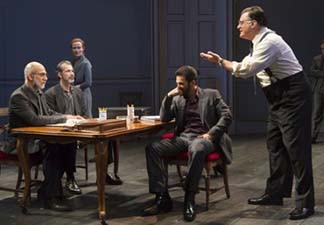
Apparently Shimon Peres doesn‘t know about the negotiations, but Arafat does. So do the Jordanians, “our patrons,” Abu Ala explains. Then the Norwegian deputy foreign minister leaks to the Americans, and Washington lets it be known that they know.
Again, the negotiators pledge not to tell the Americans what they are doing. Peres (Daniel Oreskes), when he gets involved, says, The Americans cannot stand it when others take the lead. I was this close to making peace with King Hussein and the Jordanians”until the Americans got wind and scuttled it. This, they will not scuttle. The cynical radical Hassan declares, “Our cause is an opiate they inject into masses So they won‘t turn against their capitalist masters.”
The Norwegians arrange what will be a seven-hour phone conversation between Peres in Stockholm and Arafat in Tunis. As it appears an agreement will be reached, in the background the members of the Palestinian Council are crying. The great public announcement takes place at the Rose Garden ceremony of September 13, 1993. Prime Minister Yitzhak Rabin and Chairman Yasser Arafat shake hands; President Bill Clinton is standing between them.
The agreement made the Palestinian Authority and continued talks possible. The play is an extraordinary, riveting fly-on-the-wall look at how that all came about. To explain the backsliding– the assassination of Rabin, the Second Intifada, the rise of Netanyahu — will take another play.
“Oslo.” Written by J.T. Rogers; directed by Bartlett Sher. Lincoln Center – Mitzi E. Newhouse Theater, 150 W. 65th St., New York City. 212-239-6200 Opened July 11, 2016, closes Aug 28, 2016. The production will transfer to the larger Vivian Beaumont Theater March 23, 2017. 7/31/16.

